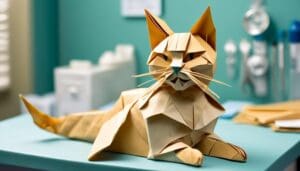Much like the fabled Puss in Boots, your aging cat has been through numerous adventures and now deserves the utmost care as they enter their golden years.
Taking charge of your older cat’s oral hygiene can make a significant difference in their quality of life, ensuring that they continue to enjoy each meal without discomfort. You’ll want to start by gently inspecting their mouth regularly for any signs of dental distress, such as redness, swelling, or missing teeth, which can indicate underlying health issues.
As you introduce a routine of brushing their teeth with specially formulated feline toothpaste, remember that patience and consistency are key. It’s not just about keeping their pearly whites sparkling; it’s about maintaining their overall health and comfort.
With a few more tips up your sleeve, you’ll be well-equipped to not only spot potential problems early on but also to prevent many oral health issues from developing further.
Stay with me, and let’s explore how you can provide your cat with the best oral care as they continue to purr contentedly by your side.
Key Takeaways
- Regular dental checkups and inspections are important for older cats to detect any dental issues early on.
- Brushing your cat’s teeth daily or a few times a week using a soft-bristled toothbrush and feline-friendly toothpaste is beneficial for their oral health.
- Incorporating dental-friendly diet choices such as dental diets and treats can help maintain your older cat’s dental health.
- Using oral hygiene products like toothbrushes, toothpaste, dental sprays, and water additives, along with professional cleanings, contribute to comprehensive oral hygiene care for older cats.
Assessing Dental Health Regularly
As the guardian of an older cat, assessing dental health regularly is crucial in warding off dental disease. Your loving attention to their oral care can prevent the discomfort and risks associated with tartar buildup, which can lead to gum disease and tooth loss.
During your gentle inspections, look for the telltale signs of a healthy mouth: gums should be pink and healthy, without any swelling or lesions, and teeth should be free of plaque and tartar. A foul odor may be a whisper of infection, urging you to seek regular veterinary guidance.
An annual oral examination, ideally during their regular health check-up, can catch issues early and keep your cat’s mouth in top shape.
Brushing Techniques and Frequency
To keep your older cat’s teeth healthy, it’s important to brush them often using the correct methods. Even though it might seem challenging, regularly brushing your cat’s teeth with patience and the right approach can prevent dental issues and keep them comfortable as they age.
Here’s how to approach this critical aspect of at-home dental care:
- Choose the Right Brush: A soft-bristled toothbrush designed for cats or a finger brush is ideal to gently clean the gum line without causing discomfort.
- Use **feline-Friendly Toothpaste**: Never use human toothpaste. Opt for a cat-specific toothpaste, which comes in flavors like poultry or fish to appeal to your cat’s taste.
- Daily Brushing is Best: Aim for daily brushing, but if that’s not feasible, brushing a few times a week can still significantly reduce the risk of dental issues.
- Be Gentle and Patient: Start by massaging your cat’s cheeks and slowly introduce the brush with toothpaste. Focus on the gum line, where plaque tends to accumulate.
If your cat resists, don’t force it. Instead, consider alternatives like dental wipes or toys. Remember, the goal of cat dental care is to keep them healthy and happy.
Regular brushing can avert painful conditions and save you on veterinary bills.
Dental-Friendly Diet Choices
While regular brushing plays a pivotal role in your older cat’s oral health, incorporating the right dental-friendly diet choices can further support their dental care regimen. Dental diets are specially formulated to help remove plaque and food debris as your cat chews. Foods like Hills Prescription Diet t/d Dental Care Chicken Flavor Dry Cat Food and Hills Science Diet Adult Oral Care Dry Cat Food are excellent choices that meet the Veterinary Oral Health Council’s standards.
You might also consider integrating dental treats into their teeth cleaning routine. Treats such as Greenies feline Catnip Flavor Adult Dental Cat Treats not only delight your cat but also promote their oral hygiene. However, it’s crucial to discuss these options with your vet to tailor the best dental-friendly diet for your cat’s specific needs.
For cats with age-related dental issues, wet food can make chewing and swallowing easier. Remember, though, that while treats can be beneficial, they should only constitute up to 10% of your cat’s diet to maintain a balanced nutrition.
| Dental Diets & Treats | Benefits |
|---|---|
| Hills Prescription Diet t/d | Helps remove plaque and food debris |
| Greenies feline Dental Treats | Encourages chewing for oral health |
| Wet Food for Easier Chewing | Aids in chewing and swallowing |
Safe Dental Treats and Chews
Selecting the right dental treats and chews for your senior feline friend is essential to ensure their comfort and safety. As cats age, maintaining oral hygiene becomes even more critical to their overall health. Here are a few tips to help you choose safe and effective dental treats and chews:
- Seek VOHC Approval: Look for dental treats that carry the Veterinary Oral Health Council (VOHC) seal of approval. This ensures that the product meets specific standards for reducing plaque and tartar.
- Soft and Digestible: Choose dental chews that are soft enough to prevent damage to your cat’s aging teeth, yet firm enough to provide a cleaning effect. They should also be easily digestible to avoid gastrointestinal issues.
- Supervise Snack Time: Always monitor your cat while they enjoy their dental treat. This can help prevent your cat from accidental swallowing or choking, ensuring they safely reap the benefits of their daily dental care routine.
- Enzymatic Action: Consider treats that contain enzymes or other additives designed to control plaque and tartar buildup. These can enhance oral hygiene without requiring extra effort from you or discomfort for your cat.
Consult with your veterinarian to tailor these suggestions to your cat’s specific dental needs, ensuring a happy, healthy smile for your beloved cat.
Oral Hygiene Products for Cats
Maintaining your senior cat’s dental health is essential for their comfort and wellbeing. Choose a cat-specific toothbrush like the Colgate Kids, My First Toothbrush, or the Pet Republique Dog & Cat Finger Toothbrush for gentle daily brushing. For cats resistant to toothbrushes, try using a finger brush or gauze strips as alternatives.
For toothpaste made specifically for cats, the Virbac C.E.T. Enzymatic Dog & Cat Poultry Flavor Toothpaste is highly recommended. Human toothpaste isn’t suitable for pets, so it’s essential to use a product designed for their unique needs. This can help in preventing dental problems and periodontal disease, which are common in older cats.
Beyond brushing, incorporate oral care into their routine with dental sprays and water additives. These can help maintain dental health between brushings. Also, consider dental cleaning diets or treats, such as Hills Prescription Diet t/d Dental Care Chicken Flavor Dry Cat Food, Hills Science Diet Adult Oral Care Dry Cat Food, or Greenies feline Catnip Flavor Adult Dental Cat Treats, which are specially formulated to support oral health.
Professional Care and Monitoring
To safeguard your aging cat’s dental health, it’s essential to schedule annual professional cleanings under anesthesia, as this allows for a comprehensive maintenance of their oral hygiene. These dental cleanings are a cornerstone of professional care and monitoring, ensuring that periodontal disease, which can significantly impact your cat’s overall health, is addressed effectively. Remember, this disease is largely preventable with proper care.
Here are four key steps to keep in mind:
- Veterinary Dental Checkups: Regular checkups are vital. During these visits, your vet can check your cat’s mouth for any signs of dental issues and determine if more frequent teeth cleanings are needed.
- Customized Care Recommendations: Veterinarians recommend specific products for maintaining oral health. Consult with them for advice tailored to your cat’s unique needs.
- Early Detection: Catching dental problems early means simpler, less invasive treatments. Don’t hesitate to seek professional advice if you notice any changes in your cat’s eating habits or mouth odor.
- Integrated Health Approach: Understand that dental health is integral to your cat’s wellbeing. Professional care and monitoring go hand-in-hand with your loving attention at home.
Frequently Asked Questions
How Do You Clean Senior Cats Teeth?
To clean a senior cat’s teeth, gently brush with a cat-specific toothpaste, massage their gums, and offer dental treats. Regular vet check-ups for professional cleanings will keep their mouth healthy.
How Can I Help My Old Cat With Bad Teeth?
You’re facing a challenge: your old cat’s teeth are in bad shape. Start by consulting a vet, then gently brush with special toothpaste, and explore dental treats that can make a difference.
How Can I Clean My Cats Mouth Naturally?
To clean your cat’s mouth naturally, gently rub their gums with a soft cloth dipped in warm water. Offer chew treats and toys to help scrape away plaque and freshen their breath.
How Do I Keep My Cat’s Teeth Clean Without Brushing?
To maintain your cat’s dental health, offer dental treats and toys that promote chewing. Also, consider a water additive or a vet-recommended diet designed to reduce plaque and tartar buildup.




